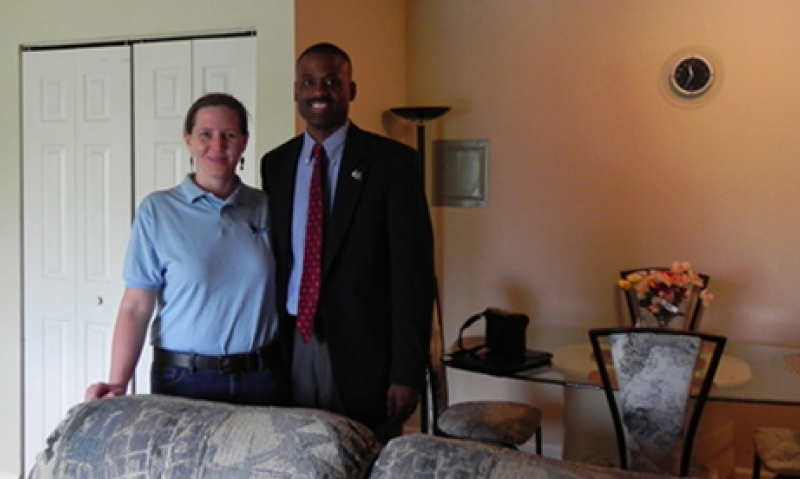
As the number of returning troops increases, so may the number of homeless veterans.
It has been almost two years since Secretary of Veterans Affairs Eric Shinseki spoke at The American Legion national convention in Louisville and pledged to end homelessness among vets within five years. It is estimated that on any given night, approximately 106,000 military veterans are without permanent shelter.
Since the Secretary's announcement, the Department of Veterans Affairs (VA) has launched or intensified a number of initiatives designed to help make good on his promise, including the creation of a dedicated information and education website.
VA has also partnered with the Department of Housing and Urban Development (HUD) in a supported housing program called HUD-VASH. The program provides permanent housing and ongoing case management services, such as mental health and substance abuse treatment, for homeless veterans who require them in order to live independently. Section 8 Housing Choice vouchers are issued on behalf of eligible veterans allowing them and their families to choose from among Public Housing Authority (PHA) allocated apartments nationwide. Thus far, more than 20,000 vouchers have been issued and the program recently received renewed funding.
The Department of Labor (DoL) is on board in the anti-homeless campaign, too. DoL's emphasis is on employment, predictably, as a measure to keep veterans off the streets through its Homeless Veterans' Reintegration Program (HVRP). To quote the HVRP web page, the program's purpose is to "provide services to assist in reintegrating homeless veterans into meaningful employment within the labor force and to stimulate the development of effective service delivery systems that will address the complex problems facing homeless veterans."
Veterans' homelessness is among the major concerns of The American Legion and one of the primary focuses of its Economic Division, headquartered in the Legion's Washington, D.C., office. It offers testimony to Congress periodically on the topic and monitors both government and private efforts to address the problem. For instance, Deputy Economic Director Mark Walker recently visited newly renovated, attractive and affordable housing for homeless veterans provided by the United States Veterans Initiative (U.S. VETS). U.S. VETS bills itself as "the nation's largest non-profit provider of services to veterans facing challenges in their transition to civilian life." It was organized in the early 1990's.
According to Walker, "U.S. VETS in the District of Columbia began providing services in 1997 through the National Collaboration for Homeless Veterans AmeriCorps Program. The D.C. location serves 43 veterans daily. Nationwide, the organization operates programs at 11 sites in five states, as well as D.C., with beds to accommodate more than 2,100 veterans every day."
Representatives from the Department of Housing and Urban Development, Labor and Veterans Affairs will be among those participating in a Homeless Veterans Roundtable during The American Legion National Convention in Minneapolis this August. Despite Shinseki's pledge to end the problem within five years, the challenge is expected to grow, not diminish, as more and more American troops come home to a weakened economy and diminished job market.
A downloadable 14" x 19" poster promoting the Homeless Veterans Workshop, as well as a similar sessions on veterans' education and employment, is available online.
- Homeless Veterans

